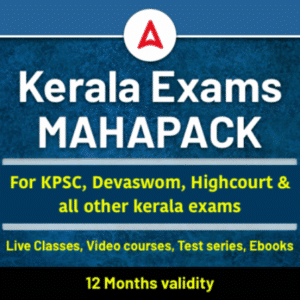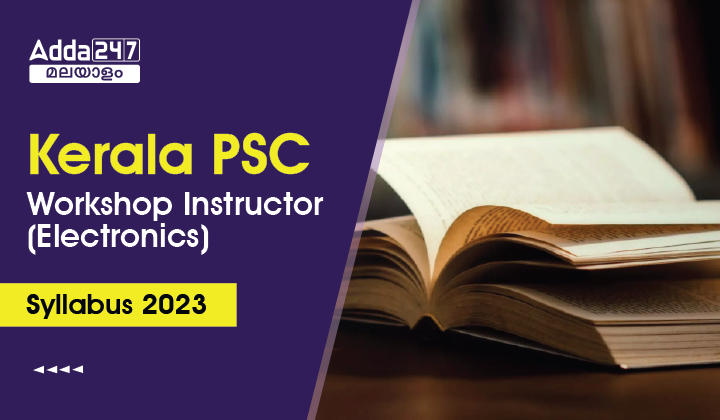Table of Contents
Kerala PSC Workshop Instructor (Electronics) Syllabus: Kerala Public Service Commission has released the Workshop Instructor (Electronics) Exam Date on its official website. Along with that it has also published Workshop Instructor (Electronics) PSC Syllabus. If you have applied for the post of Workshop Instructor/ Instructor Grade II/ Demonstrator in Electronics Engineering and would like to know the detailed syllabus, then your search ends right here. In this article we will provide the detailed syllabus of the upcoming Workshop Instructor (Electronics) Exam 2023. In order to crack the exam, one needs to have a clear understanding of the syllabus, therefore read through Kerala PSC Workshop Instructor (Electronics) Syllabus to broaden your perspective. You can also download Workshop Instructor (Electronics) in pdf format.
| Kerala PSC Workshop Instructor (Electronics) Syllabus | |
| Organization | Kerala Public Service Commission |
| Category | Exam Syllabus |
| Name of the Post | Workshop Instructor/ Instructor Grade II/ Demonstrator in Electronics Engineering |
| Last Date to Submit Confirmation | 23rd March to 11th April 2023 |
| Official Website | www.keralapsc.gov.in |
Fill the Form and Get all The Latest Job Alerts – Click here

Kerala PSC Workshop Instructor (Electronics) Syllabus 2023
Kerala PSC Workshop Instructor (Electronics) Syllabus 2023: പരീക്ഷയ്ക്കുള്ള തയ്യാറെടുപ്പുകൾ ആരംഭിക്കാൻ സമയമായി. പരീക്ഷയിൽ വിജയിക്കുന്നതിന്, സിലബസിനെക്കുറിച്ച് വ്യക്തമായ ധാരണ ഉണ്ടായിരിക്കണം, അതിനാൽ കേരള PSC വർക്ക്ഷോപ്പ് ഇൻസ്ട്രക്ടർ (ഇലക്ട്രോണിക്സ്) സിലബസ് 2023 വിശദമായി വായിച്ച് മനസിലാക്കുക. നിങ്ങൾക്ക് Kerala PSC Workshop Instructor (Electronics) Syllabus Pdf രൂപത്തിൽ ഡൗൺലോഡ് ചെയ്യാം.
Workshop Instructor (Electronics) Syllabus Kerala PSC: Overview
ചുവടെ നൽകിയിരിക്കുന്ന പട്ടികയിൽ Workshop Instructor (Electronics) Syllabus Kerala PSC സംബന്ധമായ എല്ലാ പ്രധാനപ്പെട്ട വിവരങ്ങളും ലഭിക്കും.
| Workshop Instructor (Electronics) Syllabus Kerala PSC | |
| Organization | Kerala Public Service Commission |
| Category | Exam Syllabus |
| Department | Technical Education |
| Name of the Post | Workshop Instructor/ Instructor Grade II/ Demonstrator in Electronics Engineering |
| Category No. | 677/2022 |
| Last Date to Submit Confirmation | 23rd March to 11th April 2023 |
| Mode of Examination | ONLINE/ OMR |
| Medium of Questions | English |
| Total Marks | 100 |
| Duration of Examination | 1 Hour 30 Minutes |
| Official Website | www.keralapsc.gov.in |
Kerala PSC Workshop Instructor (Electronics) Exam Pattern
| Kerala PSC Workshop Instructor (Electronics) Exam Pattern | ||
| Modules | Topics | Marks |
| Module I | Semiconductor Diodes | 10 Marks |
| Module II | Basic Electrical | 10 Marks |
| Module III | Transistors | 10 Marks |
| Module IV | Electronic Measuring Instruments | 10 Marks |
| Module V | Operational Amplifier | 10 Marks |
| Module VI | Oscillators | 10 Marks |
| Module VII | Digital Electronics | 10 Marks |
| Module VIII | Television | 10 Marks |
| Module IX | Communication Systems | 10 Marks |
| Module X | Microcontroller | 10 Marks |
Kerala PSC Workshop Instructor (Electronics) Detailed Syllabus
Module I: Semiconductor Diodes
- Energy band diagram of conductors, insulators, semiconductors, intrinsic & extrinsic semiconductors, doping, P&N type, majority & minority carriers. PN junction, drift & diffusion current, depletion layer, potential barrier, PN junction under forward & reverse bias, break down on diodes, Zener & avalanche breakdown. VI characteristic of PN junction diode, static and dynamic resistance, Different types of diodes – power, Zener, varactor and tunnel diodes – p-n junction diode, DC load line analysis, Half-wave rectifier, Full-wave rectifier, Bridge rectifier, Capacitor filter circuit, Zener diode- Regulator circuits
Module II: Basic Electrical
- Superposition theorem, Thevenin’s theorem, Norton’s theorem, reciprocity theorem and maximum power transfer theorem -fundamentals of alternating current -waveform, time period, frequency and amplitude, phase difference, R.M.S value, average value- A.C. through resistors, inductors and capacitors – Q-factor of a coil- resonance circuits – R-L-C -Series & parallel circuits – inductive reactance, capacitive reactance and impedance – line voltage and current, phase voltage and current in 3 Ø system- star & delta connections. Transformer-Losses in transformers- Auto transformer power transformers – DC generator – emf equation of DC generator- DC shunt generator – commutator in DC machines – DC motors – Fleming’s left hand rule, shunt, series, compound motors – speed control using field control and armature voltage control – Alternators – relationship between frequency and number of poles- 3 phase induction motor- case and slip ring induction
motors – starting of AC Motors – 3 phase induction motors- single phase induction motor, universal motor, stepper motor.
Module III: Transistors
- CB Configuration – CE configuration, current relation (Collector current in terms of base current & leakage current-Input & output characteristics, determination of input & output resistance. CC configuration – expression of emitter current in terms of base current and leakage current Comparison of CB, CE & CC, current gain, voltage gain & leakage current.
- Transistor biasing techniques – DC load line – Fixing the operating point, Need for stabilization. Different biasing methods – Working of a single stage CE transistor amplifier.
- JFET, P-channel and N-channel- FET- comparison with Bipolar Transistor-advantages and disadvantages – parameters of JFET – MOSFET -types – depletion and enhancement modes- UJT, VI characteristics – SMD- types of opto-electronic devices – photo resistors, photodiodes, phototransistors, photovoltaic cells, LEDs, LCDs, and Opto-couplers. Power electronics: UJT, FET, Principle and operation of JFET, Parameters of JFET- MOSFET, Depletion MOSFET, Enhancement MOSFET, Difference between JFET & MOSFET SCR, diac, triac, UJT, different commutation circuits, dc motor drives, LVDT, induction heating, di electric heating SCR – Integrated circuit technology- SMD, advantages.
- Power supply – Voltage regulations – Line Regulation – Load regulation – Shunt voltage regulator – Series voltage regulator – Fixed and Variable power supplies – Protection circuits – Current Limiting – Fold Back limiting. SMPS- UPS different type – Online and off line.
Module IV: Electronic Measuring Instruments
- Analog, digital meters, whetstones bridge, q meter, CRO, signal generator, recorders, analogue and
digital meters, Data acquisition systems.
Module V: Operational Amplifiers
- Differential amplifier– parameters of op-amp – virtual ground –Input offset voltage, input offset current, input bias current, output offset voltage, CMRR, slew rate -Characteristics of ideal and actual op-amp – inverting amplifier, non-inverting amplifier, voltage follower, comparator, difference amplifier, summing amplifier, integrators, differentiators-Zero crossing detector, positive and negative voltage level detector – Schmitt trigger, window detector, logarithmic amplifier, antilog amplifier, Instrumentation amplifier – DAC and ADC: R-2R ladder type D to A converter, Counter type, dual slope integration and successive approximation type ADCs, Flash ADC- Half wave and full wave precision Rectifiers – Active filters –LPF, HPF, BPF filters– RC phase shift and Wien bridge oscillators, Astable and Monostable Multi vibrators, Triangular wave generator PLL principle of operation, lock range, capture range- Applications of PLL , VCO -LM 566 Timer IC 555- working principle – Monostable and Astable multi vibrators using IC 555.
Module VI: Oscillators
- Barkhausan criterion for oscillation- working of RC oscillators – RC phase shift oscillator and wein bridge oscillator- LC oscillators – Hartley and colpitt’s oscillators – crystal oscillator -Multi vibrators- Bistable multi vibrator – synchronous and Asynchronous methods of triggering – monostable multi vibrator using transistors – triggering methods of monostable multi vibrators operations of astable multi vibrators using transistors- operation of Schmitt trigger circuit- UTP and LTP
Module VII: Digital Electronics
- Number Systems: Decimal Number System, Binary Number System, Converting Decimal to Binary, Hexadecimal Number System: Converting Binary to Hexadecimal, Hexadecimal to Binary, Converting Hexadecimal to Decimal, Converting Decimal to Hexadecimal, Octal Numbers: Binary to Octal Conversion. decimal, binary, octal, hexa decimal systems, gray code, BCD code,
- Boolean algebra, Switching and Logic Levels, Boolean Algebra Theorems, De Morgan’s theorem. Logic gates, NOT Gate, AND Gate, OR Gate, XOR Gate, NAND Gate, NOR Gate, X-NOR Gate, Half adder, Full adder, Flip-Flops : RS Flip-Flop, Gated Flip-Flops, JS Flip Flops,
- Counters, shift registers. Microcontroller: 8051 Architecture, features, flag registers, general purpose registers.
- Logic families SSI, MSI, LSI, VLSI and ULSI – positive and negative logic- TTL and Schottky TTL, TTL inverter, Emitter Coupled Logic, CMOS logic family, features of CMOS logic gates, VIL, VH, VOL, VOH, noise margin, noise immunity, propagation delay, current sourcing and current sinking, fan in, fan out, power dissipation.
- Semiconductor memory ROM and RAM – working of ROM- working of dynamic memory- Compare Static RAM, Dynamic RAM, Flash ROM and NVRAM – SD RAM and EDO RAM- secondary memory Optical memory- Magnetic bubble memory
Module VIII: Television
- Luminance, chrominance, compatibility, additive and subtractive mixing of colours –Colour TV camera- working, Delta gun, Trinitron colour picture tubes. Basic Colour TV systems – NTSC, SECAM and PAL system – Advantages and disadvantages of one over the other – PAL D-Coder Frequency interleaving- PAL-D Colour TV Receiver – AFT-Colour encoder Colour killer – Colour controls, HDTV- Digital TV. NTSC, PAL, SECAM modes of transmission, Satellite TV receiving system – Antenna, LNA, LNB, FEC- Digital satellite receiver, CCTV, MATV, CATV systems.- Video recording – VHS and U-matic formats, VCD, DVD, MPEG.
Module IX: Communication Systems
- EM waves, propagation of EM waves, Modulation: Amplitude Modulation, Frequency Modulation, Phase modulation, AM Detection, FM detection, Super hetero dyne receiver system, bandwidth requirements, PAM, PCM, , ASK,FSK, BPSK, QPSK, Offset PSK, BFSK, MSK. Noise in communication systems, different types of noise, signal to noise ratio, methods to improve signal to nose ratio. Antenna: Physical concepts of radiation of electromagnetic energy and radiation pattern, point source, gain, power gain, directivity, aperture, effective area, radiation pattern, beam width, radiation angle, radiation resistance. Types of Antennas -Half wave dipole, folded dipole, Yagi-Uda antenna, Marconi antenna, rhombic antenna, parabolic antenna, Antenna arrays – End fire array and broadside antenna.
Module X: Microcontroller
- Features – Architecture of 8051 – Memory organization – Program memory – Data memory – Internal RAM structure – B register, Accumulator, Register Banks – Bit addressable area – Special Function registers – Program Status Word – Flags – Architecture of Ports, Timer / Counter – Different modes – Serial communication port – different modes – SBUF –Interrupts- External ROM and RAM interfacing – Addressing Modes.
Kerala PSC Workshop Instructor (Electronics) Syllabus: Download PDF
Kerala PSC Workshop Instructor (Electronics) Syllabus PDF ഡൗൺലോഡ് ചെയ്യാൻ, താഴെ നൽകിയിരിക്കുന്ന ലിങ്കിൽ ക്ലിക്ക് ചെയ്യുക.
Kerala PSC Workshop Instructor (Electronics) Syllabus PDF Download
| RELATED ARTICLES |
| Kerala PSC Librarian Grade IV Syllabus |
| Kerala PSC Inspector of Legal Metrology Syllabus |
Also Read,
Weekly/ Monthly Current Affairs PDF (Magazines)
ഇതര പരീക്ഷകളുടെ ഏറ്റവും പുതിയ വിജ്ഞാപനങ്ങൾ, ദൈനംദിന ക്വിസുകൾ എന്നിവയ്ക്കായി ADDA247 മലയാളം ആപ്പ് ഡൗൺലോഡ് ചെയ്യുക.
Download the app now, Click here
ഇത് നിങ്ങൾക്കുള്ള സമയമാണ്. പരീക്ഷയ്ക്ക് സ്വയം തയ്യാറാകാനുള്ള ഏറ്റവും അനുയോജ്യമായ സമയമാണിത്. നിങ്ങൾ വീട്ടിൽ നിന്ന് ഞങ്ങളോടൊപ്പം പരീക്ഷയ്ക്ക് തയ്യാറാകുക. മികച്ച കോഴ്സുകൾ, മികച്ച ഹെഡ് ട്രെയിനർമാർ, ലളിതമായ നിർദ്ദേശങ്ങൾ, ഗുണനിലവാരമുള്ള ക്വിസ് ചോദ്യങ്ങൾ ഞങ്ങൾ നിങ്ങൾക്ക് നൽകുന്നു. ഈ അത്ഭുതകരമായ സമയം പഠിക്കാൻ നിങ്ങൾക്ക് ബുദ്ധിമുട്ടുള്ള കോഴ്സിന്റെ ഭാഗങ്ങൾ ശക്തിപ്പെടുത്തുക. Mock Tests, Test series , E-Books , Daily Current Affairs, Weekly Current Affairs, Monthly Current Affairs എന്നിവയുടെ സൗജന്യ PDF കൾ അങ്ങനെ നിരവധി പഠന സാമഗ്രികൾ ഇംഗ്ലീഷിലും മലയാളത്തിലും (English & Malayalam) ADDA 247 നിങ്ങൾക്ക് നൽകുന്നു. സൗജന്യവും, പണമടച്ചുള്ളതുമായ ക്ലാസുകൾ ഞങ്ങൾ നിങ്ങൾക്ക് ലാഭകരമായ രീതിയിൽ വാഗ്ദാനം ചെയ്യുന്നു.
***വരാനിരിക്കുന്ന പരീക്ഷകളിൽ വിജയിക്കാൻ ഞങ്ങളോടൊപ്പം ചേരുക***
Use Coupon code- KPSC (എക്കാലത്തെയും വിലക്കുറവ്)
*മലയാളത്തിലെ തത്സമയ ക്ലാസുകൾ ഇപ്പോൾ നിങ്ങളുടെ വീട്ടിൽ ലഭ്യമാണ്*

Kerala Exams Mahapack
*ലക്ഷ്യത്തിലേക്കുള്ള ആദ്യ ചുവടുവെപ്പ് | ADDA247 മലയാളത്തിൽ പരിശീലനം ആരംഭിക്കൂ*
Telegram group:- KPSC Sure Shot Selection
KPSC Exam Online Test Series, Kerala Police and Other State Government Exams




